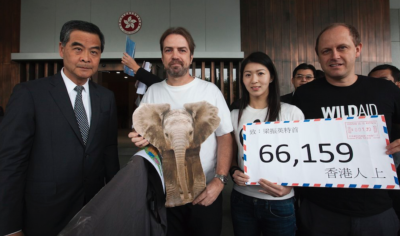
HONG KONG SAR (13 January 2016) —In his Annual Policy Address, Hong Kong SAR’s Chief Executive Leung Chun-ying announced Wednesday that the government will legislate a ban on local elephant ivory sales, joining mainland China and the United States in a global effort to end Africa’s elephant poaching crisis that has claimed up to 33,000 elephants a year.
Responding to several hidden camera investigations into the city’s ivory trade released last fall, Hong Kong SAR environment officials had previously said they are “open-minded” to the possibility of ending legal ivory sales reversing their previous position that the trade was “strictly regulated.”
Leung also announced that maximum penalties for endangered species trafficking would be sharply increased to seven years imprisonment, compared with the current two years under Hong Kong SAR’s Endangered Species Ordinance.
“History has shown that legal ivory sales only serve to provide a cover for illegal trade, which fuels the rampant poaching we see across Africa. Hong Kong SAR has always been the epicenter of that trade, so we congratulate CY Leung and the government for this historic step. Coupled with a 50% drop in ivory prices in China over the last 18 months, the end of the crisis may be in sight,” said WildAid CEO Peter Knights.
The Illusion of Control: Hong Kong SAR’s ‘Legal’ Ivory Trade, published by WildAid and the African Wildlife Foundation in October 2015, documented how the legal sales licensing was being abused, and more recently reports suggested that 90% of the ivory sold in Hong Kong SAR was illegally exported to mainland China.
In September 2015, United States President Barack Obama and Chinese President Xi Jinping agreed to halt domestic ivory sales in the US and China — a joint commitment that also relies on the complete closure of the Hong Kong SAR market, a potential “back door” for ivory to enter the mainland of China.
The Hong Kong SAR public overwhelmingly supports banning the ivory trade: A May 2015 University of Hong Kong SAR survey found that 75% of Cantonese-speaking residents support, or strongly support, a commercial ivory sales ban.
During his Policy Address, Leung said:
The Government is very concerned about the illegal poaching of elephants in Africa. It will kick start legislative procedures as soon as possible to ban the import and export of elephant hunting trophies and actively explore other appropriate measures, such as enacting legislation to further ban the import and export of ivory and phase out the local ivory trade, and imposing heavier penalties on smuggling and illegal trading of endangered species. Meanwhile, the Government will strengthen enforcement and take rigorous action against the smuggling and illegal trade in ivory.
Further Reading:
Stay in touch and get the latest WildAid updates.
SIGN UPAbout WildAid
WildAid is a non-profit organization with a mission to protect wildlife from illegal trade and other imminent threats. While most wildlife conservation groups focus on protecting animals from poaching, WildAid primarily works to reduce global consumption of wildlife products such as elephant ivory, rhino horn and shark fin soup. With an unrivaled portfolio of celebrity ambassadors and a global network of media partners, WildAid leverages more than $308 million in annual pro-bono media support with a simple message: When the Buying Stops, the Killing Can Too.
Journalists on deadline may email communications@wildaid.org